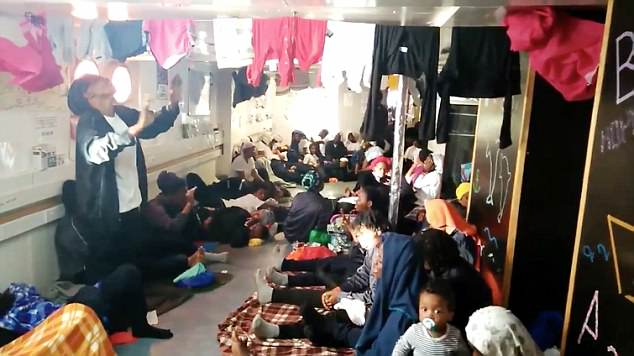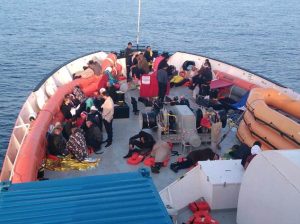
The fate of 629 migrants on a rescue ship in the Mediterranean was in the balance last night amid fears of mutiny.
Italy and Malta have both refused to let the vessel dock and charity workers said the passengers were becoming ‘increasingly anxious and desperate’.
The rescuers had initially shielded the migrants from the knowledge that they were stranded in international waters. But, faced with a barrage of questions, they last night told them why they had been stuck at sea since Saturday night.
Pictures showed humanitarian workers desperately trying to calm tensions on board the Aquarius as food supplies dwindled.

The situation threatens to spark a fresh EU migration crisis – with Italy vowing to turn away boats carrying migrants from Africa.
Despite international condemnation, Matteo Salvini, who is Italy’s new deputy PM and interior minister, said his country’s ports would remain closed.
Mr Salvini, who has promised to deport hundreds of thousands of migrants, said: ‘Saving lives is a duty, but transforming Italy into an enormous refugee camp isn’t.’
Calling for Brussels to resolve the issue, he said: ‘Italy has stopped bowing its head and obeying. This time we say no.
‘We are contacting the European Commission so that it can fulfil its duties toward Italy that have never been respected.’
Italy’s prime minister, Giuseppe Conte, said: ‘This is an important turning point. Starting today, Italy is no longer alone.’
The strategy will fuel concerns about what will happen to the thousands of migrants expected to make the perilous journey from African shores to Italy this summer.
The migrants left floating on Aquarius had been picked up during six different rescue operations off Libya’s coast in nine chaotic hours on Saturday and Sunday.
The crowded humanitarian vessel, which has a capacity of 550, became a refuge for 629 people – including 123 unaccompanied minors, 11 young children and seven pregnant women.
Some had severe burns caused by the mix of petrol and seawater that often sloshes around the bottom of the rubber boats in which the migrants were packed.
Aquarius is chartered by the Franco-German charity SOS Méditerranée in partnership with Doctors Without Borders. Yesterday Spanish prime minister Pedro Sánchez said he would give safe harbour to the ship and its passengers.
But Doctors Without Borders warned that the journey to Valencia could take three days, jeopardising the safety of the passengers.
It said in a tweet: ‘Spain’s offer of safe port of Valencia is 1,300 kilometres away – further three-day journey with Aquarius already well over maximum capacity.
‘Health and safety of people rescued on board including sick and injured people, pregnant women and children must come first.’
The Aquarius said it had not received any communications from the authorities in Rome or Madrid. It is stuck 35 miles from Italy and 27 miles from Malta.
Initially, the atmosphere on the ship was described by journalists as calm and even joyful.
Videos were posted showing a group of Nigerian women clapping, dancing and singing in the darkness in a bid to keep spirits high.
Another video showed women – some with young children – waking to early morning prayers that were sung with the words ‘All I have to say is thank you, God.’
The women, some of whom were cradling babies, had slept on the floor of the ship in ‘unbearably hot’ conditions.
The men mostly slept outside on the deck, using lifejackets as makeshift pillows. When the sun rose, passengers strung up blankets to shelter themselves from its blistering rays.
The 123 unaccompanied minors were tagged with yellow wrist bands to help distinguish them from other passengers on the ship.
As soon as the migrants arrived on board, each of them was given water, a blanket, clean clothes, a hat and 2,400 calories in energy bars. The women were sent to a shelter room, those who smelt of petrol to the shower, and those that were sick to a bench to wait for medical care.
On Saturday, Aquarius and its rescue teams had been asked by Italian authorities to pick up 400 migrants who had already been picked up by the Italian navy, the country’s coastguard and private cargo ships.
En route, it received a call diverting it to two small boats in distress more than 50 nautical miles off the coast of Libya.
As darkness fell, and crew members battled to carry out a simultaneous rescue, one of the two rubber boats broke, dragging more than 40 people into the water.
David Beversluis of Doctors Without Borders said: ‘All the survivors are exhausted and dehydrated because they spent many hours adrift in these boats: there are many survivors with skin burns from the mixture of gasoline and seawater.’
The rescue team recovered 229 survivors who were brought onto the Aquarius. The ship then returned to complete the transfer of the 400 migrants who had been waiting aboard Italian coastguard vessels and the Jolly Vanadio, an Italian merchant ship.
SOURCE: MAIL.ONLINE






Be the first to comment